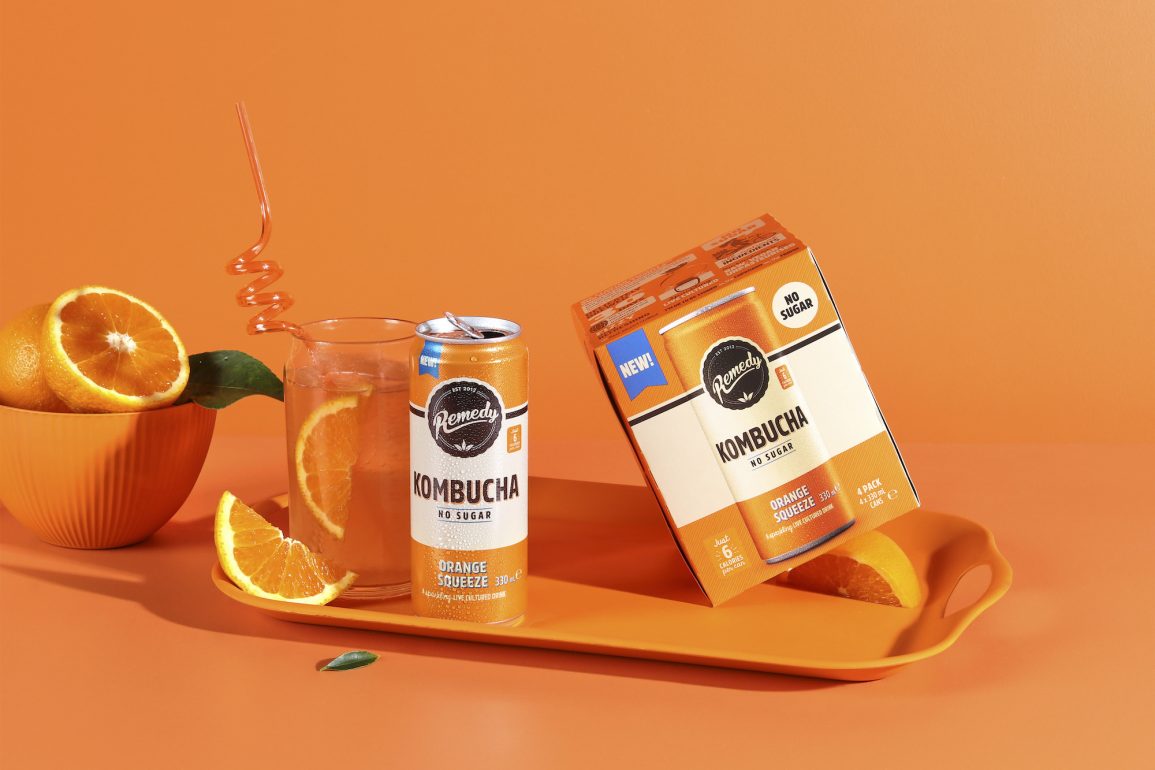Remedy Kombucha’s Healthy New Spin on Orange Soft Drinks – Kombucha has gained popularity as a health drink over the years, and people enjoy it for its unique taste and potential health benefits mainly due to its probiotic content and antioxidant properties.
Kombucha is a fermented tea beverage that has been consumed for centuries, believed to have originated in China, available in various flavours as it can be infused with fruits, herbs, or other natural ingredients and Women Talking had the opportunity to try the new Remedy Kombucha Orange Squeeze.
Carefully crafted Remedy’s latest flavour delivers bold citrus notes, and, like the rest of their range, it is light, fizzy, and refreshing. Here we have the perfect healthier alternative to traditional sugary or artificially sweetened orange soft drinks: not only does Remedy kombucha contain live cultures and organic acids to support gut health, but it is also free from sugar and contains only natural ingredients.
Remedy Orange Squeeze is made using Remedy’s unique 30-day, small-batch brewing process, which creates strong live cultures and complex flavour notes. This long-age ferment also removes all sugar, creating a shelf-stable, fizzing delicious and 100% plant-powered kombucha.
Launched in Australia in 2012 by husband-and-wife team Sarah and Emmet Condon, Remedy Kombucha has grown rapidly to become the UK’s favourite kombucha brand, sold in leading UK retailers.
Due to the fermentation process, kombucha is often considered a probiotic-rich drink, meaning it contains beneficial bacteria that can potentially support gut health.
Registered Nutritionist Emily English, speaking at the recent launch of Remedy Kombucha Orange Squeeze Shares Insight on Gut Health, the foods to fuel it – and the ones to avoid…

Diversify and Eat for Two. I see so many people who are cutting out food groups, or who feel like they can’t eat certain foods, but you should always think about adding, rather than taking away. The biggest tip I give my clients is to think about eating for two at every single meal. Whenever I’m preparing my breakfast pots or my morning oats, I always consider what else I can add that is going to feed my microbiome. You can focus on the smallest additions, such as adding some seeds, sprinkling on some herbs, or cooking with good extra virgin olive oil – all these things will help to support your microbiome.
Consider Sensitivities versus Allergies. There is a difference between food allergies, which you can test for, and food sensitivities, which you can’t, with allergies also typically resulting in a reaction that you can see or feel, such as hives, or itchiness. With sensitivities, I always say that it’s not how the food is making you respond, it’s how your gut is responding to the food; there can be a whole host of reasons why you have developed a sensitivity to a certain type of food and it’s really important to look at supporting the foundation of the gut first before you cut out a whole group of foods that you feel like you can’t eat.
Weave in Ferments. We see that people who consume a good number of ferments within their diet have better microbiome diversity and overall gut health, and they are easy to incorporate into your diet. It can be as simple as adding a little serving of sauerkraut or kimchi into a main course, including kefir in your yoghurt bowl, or drinking kombucha with your meal. My go-to is Remedy Kombucha, which uses a combination of black and green tea which are packed full of antioxidants and polyphenols, and which is completely free of sugar, meaning that I can have it daily with my lunch and I’m not going to be damaging my gut with excessive sugar intake.
Embrace Carbs, Chocolate and Wine! Good, wholegrain carbs are a simple change to consider when choosing products such as rice, whole grains, and bread. Carbs contain beta-glucans which are really heart-healthy and help feed your microbiome; they also contain fibre which acts as a kind of ‘sweeper’. If you want to imagine them in your gut, sweeping everything through and helping your body’s natural detox methods. Fibre isn’t the only thing that feeds our gut – polyphenols and antioxidants do too, and we tend to find these in good dark chocolate and red wine, though this should still only make up a small part of your overall diet!
Choose wisely when indulging in sugary snacks. Particularly in the context of a diet that lacks diversity, high sugar can feed the bad bacteria in our gut and promote inflammation. Reaching for a sugar hit on an empty stomach and when you reach that 4.30 pm slump often results in fatigue, brain fog, and feeling tired when that sugar crash hits. If you do have sugar, think about when and what you’re consuming it with. If you partner your sugar with a meal containing protein and fibre, you tend to see a much lower sugar spike, while the meal will nourish our good bacteria. So having a nice chocolate bar after a meal is a much better time to have it, rather than eating it on an empty stomach as a quick fix for a slump in energy.
Drink Alcohol with Caution. A good, strong gut lining creates a barrier that prevents inflammation, but alcohol can irritate this. If you do over-indulge, try to think about what you can do to support and rebalance that gut – drinking a Remedy Kombucha, adding some kimchi to your breakfast or some rye to your eggs is a really good way to restore and replenish good bacteria.
In conclusion, if you enjoy the taste of kombucha and tolerate it well, it can be a refreshing and potentially beneficial addition to a balanced diet.
Poppy Watt


